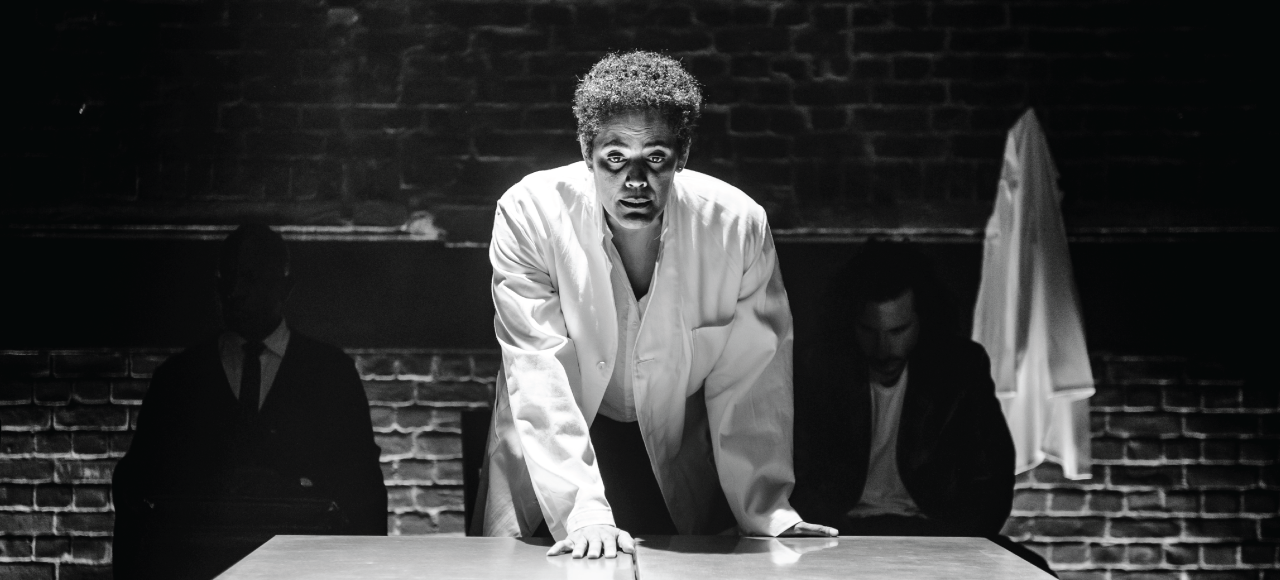
The Plague by Albert Camus
Adapted for stage by Neil Bartlett
Arcola Theatre
It’s one of those books you read as a teen. All that irony, the brash down-with-the-system, damn-the-man posturing – it’s perfect for disillusioned humans entering the adult world. As such, The Plague is also one of those novels that – like one’s teenage years – it’s tempting to dismiss.
Doing so would be an error.
The original (published in 1947) was intended both as a comment on the devastatingly literal plagues that ravaged Algeria, and as a critique on the rapid and horrific spread of fascism across Europe. It’s not difficult to see why Neil Bartlett has decided to adapt it for the stage in 2017. You might think there isn’t much subtlety to the story – you’d be wrong – but even so, as we’ve seen with Trump and May’s strong and stable soundbites, the political world is, at the moment, about as subtle as a sledgehammer.
Bartlett, who both adapted the novel, and directed the play (at the Arcola Theatre), has done a good job. On a formal level, the production is pleasingly pared-down. Five actors (all excellent) prowl the stage with a surreal intensity; they are witnesses and (largely) survivors, telling their stories to an invisible tribunal (us!) and occasionally shouting into telephones. The chronological shifts are neat: the characters move from after-the-fact reports to first-person present-tense in a way that is both economical and effective. There are, throughout, minor-key piano chords – and screams. I suppose they were intended to add to the atmosphere, but I found them a little distracting. Bartlett’s casting also addresses some of the troubling aspects of the book – which features, as far as I remember it, no women, and only a couple of non-white, non-French characters (rather disturbing, given it’s set in Algeria).
So much for form, what about content? Impressively, Bartlett manages to transpose most of the central themes of the novel onto the stage. Two strands of the original story were particularly emphasised: the importance of bearing witness, and – interestingly – the hope one may find in people drawing together. Bartlett writes, in the production’s (very snazzy) programme:
“I thought long and hard about trying to create this piece, and while I was considering my decision I kept on coming back to one particular passage in the text. On one of the very last pages of the original novel somebody says, reflecting on their decision to speak about their experiences of the plague, ‘I decided to not be one of the people who keep silent, but to speak up and bear witness; to make sure that there is at least some memory of the injustices and the violences that have been done to people, and to put on record as simply as I can what it is that you learn when you live through a time of plague, namely that there is more to admire about people than to despise or despair of.’ The dangerous, unstable spring of 2017, which is when this script was first staged, felt like a good time to try and find a way of speaking those challenging words in public.”
Fair enough – but this passage also points to one of the issues I have with both book and adaptation. Both are concerned with notions of guilt and responsibility. There’s guilt on the part of the government, who have failed to protect its citizens (from plague and/or fascism) – and there’s a responsibility on the part of the citizenry to speak up, and out, against these wrongdoings. One central strand of the book, prominently woven into the play, is the criminal neglect – indeed outright violence – perpetrated by the authorities against the residents of the city (whether the faceless government who fails to control the plague, or the board of doctors who patronise and try to silence Dr Rieux).
Complex, subtle, beautifully written – sure. But the story of The Plague is teenagery too in as much as it rails against ‘the authorities’ (damn the man, down with the Etc.!). The characters are aware they are, individually, in some sense ‘to blame’ for the events that unfolded (especially the dubious Mr Cottard) – but ultimately, the story describes a plague, a phenomenon that sweeps in from elsewhere, of which they are the victims. Responsibility is deferred. Damn the man, not yourself.
To refer back to Bartlett’s comment, it’s not the spring of 2017 that was/is dangerous and unstable, it is society, of which we are all members. On one level, it might have served Bartlett’s ends better to emphasize this, rather than recite the teenager’s lament against authority.
Adam Ferner works at the Royal Institute of Philosophy and is Deputy Editor of The Philosophers’ Magazine. His book, Organisms and Personal Identity, was published by Routledge in 2016.
Image: Copyright Alex Brenner

